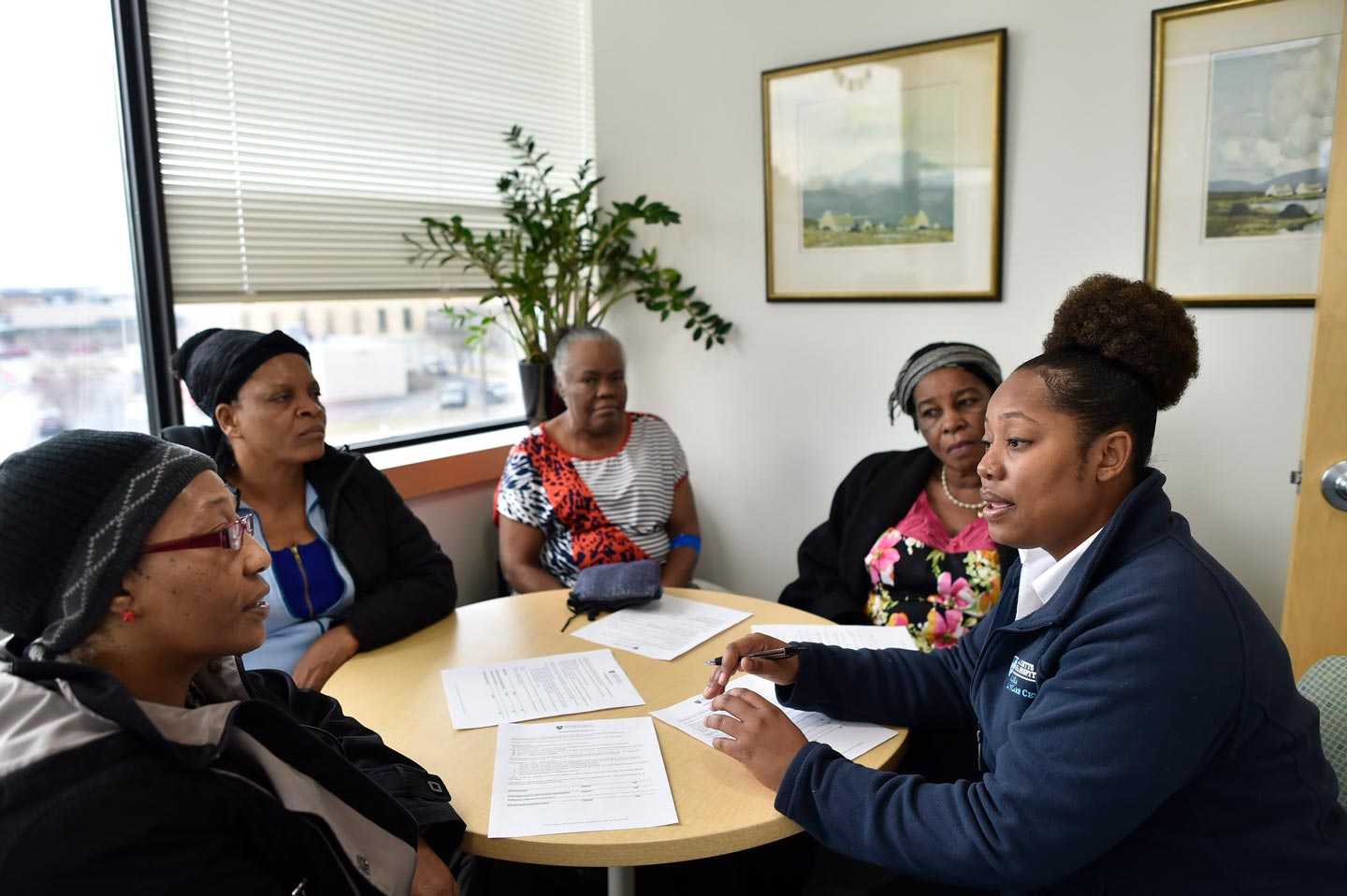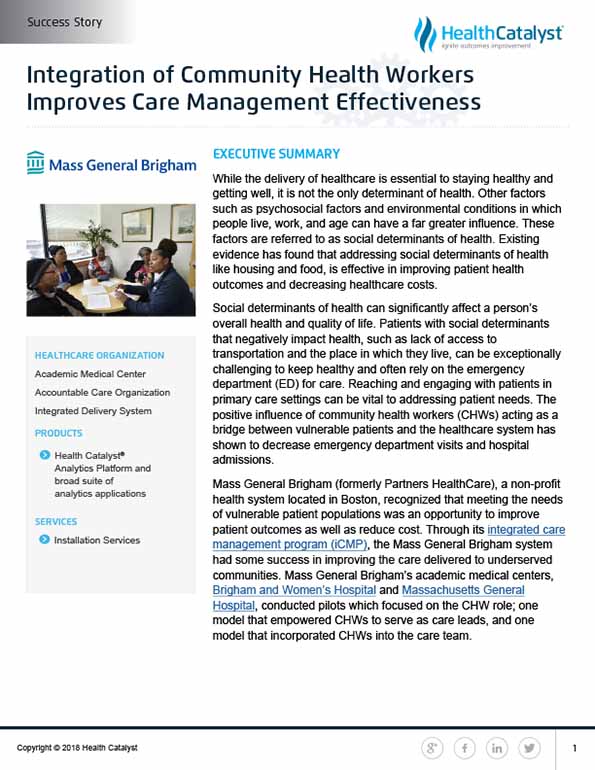The positive impacts of community health workers (CHWs) have been well documented, yet in general, CHWs remain underutilized and have not been fully integrated into care teams. Read how Mass General Brigham (formerly Partners HealthCare) successfully integrated CHWs into its integrated care management program (iCMP) care team to improve patient outcomes and reduce cost.
While the delivery of healthcare is essential to staying healthy and getting well, it is not the only determinant of health. Other factors such as psychosocial factors and environmental conditions in which people live, work, and age can have a far greater influence. These factors are referred to as social determinants of health. Existing evidence has found that addressing social determinants of health like housing and food, is effective in improving patient health outcomes and decreasing healthcare costs.
Social determinants of health can significantly affect a person’s overall health and quality of life. Patients with social determinants that negatively impact health, such as lack of access to transportation and the place in which they live, can be exceptionally challenging to keep healthy and often rely on the emergency department (ED) for care. Reaching and engaging with patients in primary care settings can be vital to addressing patient needs. The positive influence of community health workers (CHWs) acting as a bridge between vulnerable patients and the healthcare system has shown to decrease emergency department visits and hospital admissions.
Mass General Brigham (formerly Partners HealthCare), a non-profit health system located in Boston, recognized that meeting the needs of vulnerable patient populations was an opportunity to improve patient outcomes as well as reduce cost. Through its integrated care management program (iCMP), the Mass General Brigham system had some success in improving the care delivered to underserved communities. Mass General Brigham’s academic medical centers, Brigham and Women’s Hospital and Massachusetts General Hospital, conducted pilots which focused on the CHW role; one model that empowered CHWs to serve as care leads, and one model that incorporated CHWs into the care team.
Social determinants of health—the conditions in which people are born, grow, live, work, and age—have a significant impact on the overall health of an individual.1 Community health workers (CHWs) have served as frontline, culturally competent liaisons for those with complex needs, acting as a bridge between vulnerable communities and healthcare systems for several decades in the U.S.
The positive impacts of CHWs can be measured in decreased emergency department visits and reduced hospital admissions, all of which have been well documented. Yet, CHWs remain underutilized and have not been fully integrated into care teams.2,3 Mass General Brigham, an integrated health system based in Boston, Massachusetts, identified CHWs an opportunity to advance its mission and improve care to underserved patient populations.
Mass General Brigham, is a not-for-profit, integrated healthcare system based in Boston, Massachusetts. The health network includes academic medical centers, community hospitals and health centers, physician practices and post-acute care facilities. The Mass General Brigham population health team is a team of teams across Mass General Brigham dedicated to researching and redesigning clinical care in a way that focuses on the whole patient. The team partners closely with clinicians on the ground to identify, test, and design population health management strategies, programs and tools, and manage a systemwide value-based care strategy for all patient populations.
Mass General Brigham iCMP is a primary care based longitudinal care management program for complex, high-risk patients. iCMP works with patients and providers to create a personal care plan to support the patient in achieving optimal health and well-being.
Traditionally, iCMP relied on registered nurses serving as care managers. As iCMP began to grow and provide care management to a larger number of patients, Mass General Brigham identified an opportunity to better meet the needs of vulnerable patients with poor social support and unmet social needs through iCMP.
This underserved patient population had some common characteristics: Each patient had chronic complex medical issues, in addition to social challenges contributing to poor health. Patients sometimes had incredibly high use of the ED for primary care, as they were not effectively engaged with a consistent primary care team. Often, social determinants of health were contributing to the patient’s poor health outcomes. Mass General Brigham needed to adapt its care model to better meet the needs of these vulnerable patients.
To better meet the needs of vulnerable patients with complex social issues, Mass General Brigham developed two different models of incorporating the CHW role into iCMP. At one site, CHWs function as care team leads for patients whose psychosocial needs predominate and carry a caseload of patients. At the other site, CHWs are incorporated as members of the care team and work in conjunction with a registered nurse or social worker care manager.
The CHWs work with patients, and their families, who often have unmet social needs and non-clinical challenges that are impeding their health. The CHW works with patients in the clinic, and depending on the patient’s needs, goes into the community to meet the patient at a convenient location, which could be at the patient’s home, a coffee shop, or at a park. CHWs meet with the patient, talk with them about their immediate goals, and try to obtain a better understanding of the patient’s unique situation to develop a proper plan for care.
While the larger care team’s goal is often focused on stabilizing or improving a medical condition, the patient’s immediate goals may be unrelated. Patients often have food insecurity, housing needs, transportation issues, childcare needs, or concerns about community safety. The CHW works with patients and their families to address those problems since they directly impact a patient’s overall health and access to care.
After gathering as much information as possible, the CHWs collaborate with the care team and the patient’s family to ensure patients are receiving the services they need to achieve an optimal quality of life. The CHW serves as an advocate for the family, teaching them how to navigate the healthcare system, as well as how to access community services such as public transportation, social services, and education. The goal is to help patients reach their full potential by receiving services along the continuum of care.
Mass General Brigham uses the Health Catalyst® Analytics Platform and broad suite of analytics applications, as well as the electronic medical record, to monitor patients receiving care from iCMP. Mass General Brigham can then assess the impact of the CHWs on patient outcomes and cost, evaluating the difference in six months post-program outcomes relative to six months pre-program outcomes for those patients receiving support from a CHW compared to control patients. Using the analytics platform, Mass General Brigham evaluated PMPM costs, ED visits, and office no-show rates as metrics for its evaluation.
Integration of CHWs into the iCMP is yielding positive results, both when the CHW functions as the lead and as part of the care team. When comparing the difference in six months post-program outcomes to six months pre-program outcomes:
“The addition of CHWs to our “triad model” of care management (registered nurses (RNs), social workers (SWs), community health workers (CHWs) as team leads) has allowed iCMP to expand its reach to support high-risk patients who have significant social needs. The CHWs have helped patients address these needs, allowing the patient to focus on their medical issues. They are real asset to our ever-evolving program.”
- Maryann Vienneau, Program Director for Care Management
Mass General Brigham plans to expand involvement of CHWs further to better address the specialized needs of patients with unmet social needs and is adapting iCMP to better meet the needs of patients with other complex issues. Mass General Brigham is also evaluating a pilot program for patients with polypharmacy (patients in the iCMP take an average of 17 medications) and is expanding its serious illness care program to improve the lives and care of all patients with serious illnesses.


When the CHW functions as a lead, results include a:
When the CHW functions as a part of the care team, results include a:


